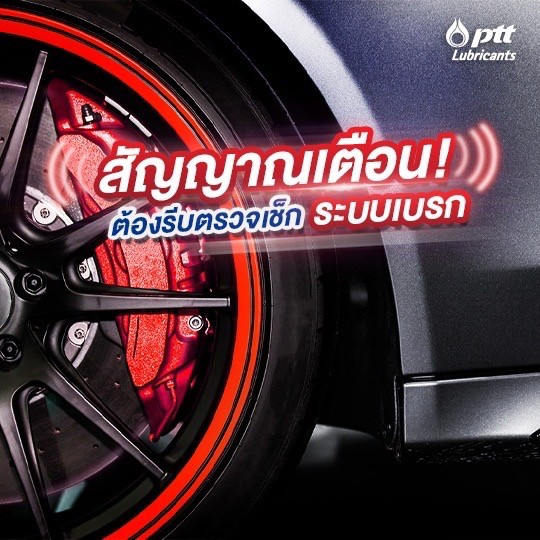
Signs That You Need to Check Your Brake System
The "brake system" is one of the most important systems in a vehicle because it is related to vehicle control and driving safety. Therefore, we should maintain the components and fluids in the brake system to ensure they are in optimal condition. However, if you experience any of the following symptoms, these are warning signs that tell us it is time to urgently check the brake system. Let’s consider at some of the common signs:
Warning Lights on the Dashboar
If the warning light on the dashboard displays a symbol resembling a "handbrake" being pulled, even though you have fully released the handbrake, it indicates a problem with the brake system. This warning light can appear in the form of a red circle with the letter "P" inside or a red circle with an exclamation mark (!), and in some car models, these symbols are displayed separately for clarity. This issue is usually caused by a low brake fluid level in the reservoir, so it’s recommended to check and fix it as follows:
1) Check the thickness of the front and rear brake pads. If the brake pads are worn out or too thin, the brake pistons will have to push the pads deeper, causing more brake fluid to be pushed out of the brake master cylinder, lowering the fluid level. The solution is to replace the brake pads
2) Check the wear of the front and rear brake discs.
3) Check for leaks in the brake booster.
4) Check for brake fluid leaks in various parts, such as brake lines, master cylinder, and fittings. If any damage or leakage is detected, replace or repair it immediately
If the brake fluid level is low but the car cannot be repaired right away, the immediate solution is to add brake fluid to the appropriate level to ensure the brake system can still function safely.
In cases where the "ABS" warning light comes on, it can be caused by various issues, such as dirty sensors, broken or loose wiring, a faulty control module, or leaking brake fluid components. If the ABS warning light appears, the vehicle should be taken for immediate repair, as it could lead to loss of control and skidding, especially when braking on wet surfaces, and increases the risk of wheel lock-up during sudden braking.
Vibrating Steering Wheel/Brakes Feel "Hard"
Whenever you apply the brake and feel the steering wheel vibrating, or notice that the brake pedal "fights back," which means it moves against your foot rhythmically as the vehicle moves, this indicates that the brake discs have become warped or uneven. This causes the brake pads to press unevenly, and the force of the uneven contact will push back the brake pistons, causing a vibration that travels through the brake pedal and steering wheel. The solution is as follows:
1) Grind the brake discs to make the surface smooth and even with the brake pads.
2) If grinding the discs isn’t possible or if it makes the discs too thin, replace the brake discs for safety.
Brake Noise
If you hear unusual "squeaking" or "scraping" sounds when applying the brakes, it might be due to the brake pads being worn out or completely gone. This causes the metal parts holding the brake pads to rub against the brake discs directly, resulting the noise.
Therefore, it's recommended to check the brake pad thickness and replace them if they are thinner than the minimum standard. If you continue using worn pads, it could cause scoring on the brake discs that can’t be repaired by grinding and may also reduce the strength and thickness of the discs. Typically, the brake pad thickness should not be less than 2 millimeters.
In addition, brake noise could also be caused by dirt, gravel, sand, or small stones getting into the brake caliper or between the brake pads and discs, preventing proper contact and causing noise. Regularly check the cleanliness of the brake pads and discs.
Hard or Soft Brakes
If you press the brake pedal and feel it is unusually hard, or you need to apply more force than usual to stop or slow down the vehicle, this is a sign of a problem in the brake system, such as low vacuum pressure in the brake booster, damaged brake pump, faulty charging system, leaking valve, or other issues.
Conversely, if you feel the brake pedal is too soft or sinks further than usual (referred to as "spongy brakes"), the issue could be worn or swollen rubber seals in the master cylinder, causing leaks around the seals. This reduces brake fluid pressure and hampers braking performance. A leaking brake system may not cause a significant drop in brake fluid levels, but the fluid may leak at the system joints, causing brake issues.
If any of these symptoms occur, you should take the vehicle to a mechanic immediately to prevent brake failure or longer braking distances that could lead to serious accidents.
Brake Fluid Leaks on the Ground
If you notice fluid leaking from your vehicle, regardless of the type of fluid (such as engine oil, transmission fluid, power steering fluid, coolant, or brake fluid), you should check the fluid levels immediately. You can check the fluid level from the dipstick, the fluid reservoir, or the tank. It's advised to top up the fluid to the proper level to ensure the systems are functioning adequately and to prevent more severe damage before having the vehicle repaired.
In the case of brake fluid leaks, they could be caused by cracked brake lines, leaking brake hoses, worn-out master cylinder seals, or other damaged brake components. This is a dangerous issue and requires immediate attention.